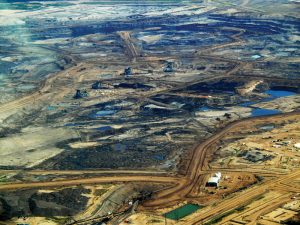Opinion: Trudeau and the Environment – ‘Trump with better hair’

July 10th, 2017
Since his election as leader of the Canadian government in 2015, Justin Trudeau has been celebrated as a liberal icon due to his progressive stance on many issues around human rights and equality, as well as his public image as a youthful and fun-loving politician (he has a penchant for colourful socks and can often be spotted wearing these at diplomatic events).
While aspects of Trudeau’s politics are certainly laudable, this carefully-manicured liberal image has diverted attention from serious shortcomings of his regime. When it comes to matters of the environment and climate change, for example, Trudeau’s track record is appalling.
The Trudeau administration certainly talks a big game when it comes to tackling climate change. For example, Trudeau assured delegates at COP21 in Paris that Canada was “back, and here to help”.
Also, in March this year at the UNESCO Week for Peace and Sustainable Development in Ottawa, the Canadian environment minister, Catherine McKenna, outlined the government’s plan “to make Canada one of the greenest countries in the world”.
“If Canada is going to reach its Paris targets – together with countries around the world – we have to reduce carbon pollution across our economy,” she added, listing various financial commitments that the government had made towards developing clean transportation and clean technology projects.
However, the promising rhetoric on environmental matters used by Trudeau and his cabinet does not reflect the reality of the action taken by his administration to date.
For example, Trudeau strongly supported US President Donald Trump’s decision earlier this year to move ahead with the controversial Keystone XL pipeline project, which would see over 800,000 barrels of oil carried per day from Canada’s Alberta tar sands to refineries in Texas.
Trudeau recently received a standing ovation from oil and gas industry executives at Houston’s CERAWeek conference in Texas for his comments on Alberta’s vast oil sands reserves, stating: “No country would find 173 billion barrels of oil in the ground and just leave them there.”
Oil production at the tar sands is expected to increase from 2.3 million barrels per day in 2014 to 4 million barrels per day by 2024, aided by the construction of the new pipeline.
Environmentalists have long expressed concerns about the mining of the tar sands as emissions for tar sand extraction and processing are significantly higher than for conventional crude oil.
Writing in The Guardian recently, Bill McKibben noted that if Canada extracts and sells the 173 billion barrels of recoverable oil estimated to be in the tar sands, it would produce 30 per cent of the carbon needed to take the earth past the 1.5C temperature target that Canada helped set at the Paris climate talks.
Trudeau’s support of the Comprehensive Economic and Trade Agreement (CETA) between the EU and Canada has also been criticised by environmentalists due to its potentially disastrous results for the environment.
The main issue of contention is the Investor Court Settlement (ICS) system to allow foreign corporations to sue Governments in a special arbitration system where state action impact on companies profitability or expectations of profit.
It is thought that this could result in a situation where governments hold back on bringing in regulation on health, labour and environmental issues for fear of being sued.
Trudeau signed this agreement on Canada’s behalf in late 2016, and have been pushing for its approval by EU member states, including during his recent visit to Ireland. As he began his tour of Ireland last week, a protest was held outside government buildings calling for the Dáil to reject CETA.
Speaking about Trudeau and his championing of CETA, Dr Cara Augustenborg, Chair of Friends of the Earth Ireland, said that the deal will “curtail our efforts to reduce fossil fuel use” by providing a “mechanism for corporations to block this urgently needed transition”.
Dr Augustenborg outlined that while Trudeau is often described as “the progressive counterweight to the likes of Donald Trump and Marine Le Pen”, he has “adopted a similarly nationalist agenda that pits Canadian self-interest against the environment and neighbouring economies” on the issues of climate and trade.
Trudeau’s enthusiastic backing of the Keystone XL pipeline and CETA clearly completely undermines Canada’s promises to confront climate change and transition to a low carbon economy and demonstrates an unwillingness to seriously explore clean energy as an alternative to fossil fuels as a source of jobs and income.
On matters of the environment, Trudeau is no progressive leader.
As Dr Augustenborg puts it, he is simply “Trump with better hair”.
[x_author title=”About the Author”]








